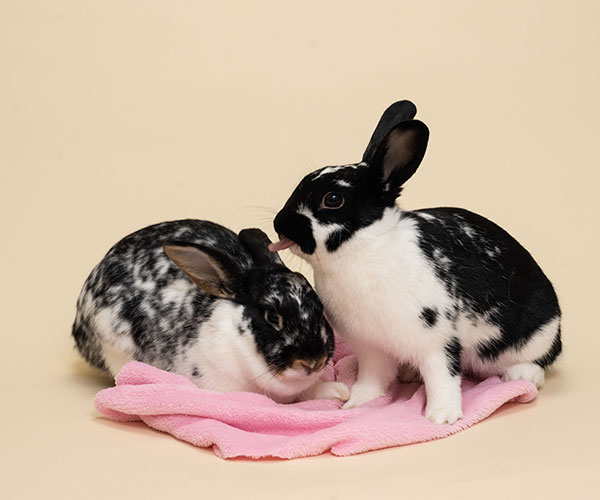Spaying and neutering for rabbits is a safe procedure when performed by experienced rabbit veterinarians. As long as the rabbit does not have a medical reason not to, HRS requires every rabbit we rescue be spayed or neutered before being placed in an adoptive home. The surgical mortality rate has been approximately 0.1% in our experience.

Unless there is a medical reason, House Rabbit Society recommends that all domesticated rabbits–whether solo or with other rabbits–be spayed/neutered for better health, for improved behavior, and because of the vast number
of homeless rabbits.
- Altered rabbits are healthier and may live longer than unaltered rabbits. The risk of developing reproductive cancers (e.g., uterine adenocarcinoma) is eliminated by spaying your female rabbit. Your neutered male rabbit may live longer as well, given that he won’t be as tempted to fight with other animals (rabbits, cats, etc.) due to his sexual aggression.
- Altered rabbits make better companions. They are calmer, more loving, and dependable once the undeniable urge to mate has been removed. In addition, rabbits are less prone to destructive (chewing, digging) and defensive behavior (biting, lunging, circling, growling) after surgery.
- Avoidance of obnoxious behavior. Unneutered male rabbits spray urine. In addition, both males and females are much easier to litter-train and once altered they are also much more inclined to stay reliably trained.
- Altered rabbits won’t contribute to the problem of overpopulation of rabbits. Each year rabbits are the third most common animal euthanized at many animal shelters in this and other countries. In addition, unwanted rabbits are often abandoned to live much shorter lives in parks or on city streets where they must fend for themselves and can suffer from starvation, parasites, and sickness. They are easy prey to other animals and at high risk of being hit by cars.
- Altered rabbits can safely have a friend to play with. Rabbits are social animals and enjoy the company of other rabbits. But unless your rabbit is altered, he or she most likely cannot have a friend, either of the opposite sex, or the same sex, due to sexual and aggressive behaviors triggered by hormones. Many altered rabbits have lovely friendships–or at least peaceful coexistence–with the family cat; however, being unaltered can result in the cat receiving unwanted mounting or be the victim of being chased or other territorial behavior on the part of the rabbit.
Surgery can be as safe on rabbits as on any animal. Don’t allow a veterinarian with little or no experience with rabbits spay or neuter your rabbit. Using appropriate anesthesia protocols and surgical and after-surgery techniques, spaying and neutering of rabbits is as safe as for any other animal.
Females can be spayed as soon as they sexually mature, usually around 4 months of age, but many veterinarians prefer to wait until they are 5 to 6 months old, as surgery is riskier on a younger rabbit.
Males can be neutered as soon as the testicles descend, usually around 8-12 weeks, but without an urgent need to do so, waiting until 5 or 6 months of age may be recommended and ideal.
Veterinarians will have their own opinions on this, but in general, after a rabbit is 6 to 7 years old the risks increase but that doesn’t mean it can’t or shouldn’t be done. Simply consult your veterinarian regarding your rabbit’s health and circumstances, and opt for pre-surgical blood work, radiographs, IV fluids, or other methods of decreasing risk.
It is always a good idea, in a rabbit over 2 years of age, to have a very thorough health check done, including blood work. This may be more expensive than the surgery, but it will help detect any condition that could make the surgery more risky.
One can shave the abdomen and look for a spay scar; however, often there is no scar visible. Hopefully, the veterinarian tattooed the skin to indicate the spay has been done. Otherwise, the only other ways of knowing is with an ultrasound evaluation by a skilled ultrasonographer or to proceed with the surgery.
- Does the veterinarian require withholding of food and water prior to surgery in rabbits? (Do not do this. Rabbits can’t vomit, so there is no risk of that during surgery. This is because rabbits should never be allowed to have an empty digestive tract. If the clinic’s counter staff ever advises you to do this, confirm with the veterinarian or clinic manager that is the case. If it is, this is not an experienced rabbit-savvy clinic. If it is not correct, let the clinic manager know that their staff needs additional training on rabbits.)
- How many spays/neuters OF RABBITS has the veterinarian done in the past year?
If you feel you need more information, here are some additional, in-depth questions:
- What was the success rate? (90% success is way too low. Every doctor, whether for animals or humans will occasionally lose a patient, usually because of an undiagnosed problem. Veterinarians across the country who spay and neuter rabbits for House Rabbit Society have lost on average less than 1%.)
- Does the veterinarian remove both the uterus and ovaries? (They should.)
- Does the veterinarian do “open” or “closed” neuters? (Closed is preferable–let your veterinarian explain the difference.)
- Is entry to the testicles made through the scrotum or pre-scrotally? (Pre-scrotal incisions are recommended and preferred, have less swelling, and rabbits are less likely to lick at it.)
- Operative procedures: What will they do pre-operatively to find any potential problems? How often will the veterinarian and the technicians look in on your rabbit and what will they look for? How will they support your rabbit in the hours after surgery? (Warmth, quiet, and stimulation.)
- Do not change the diet before the surgery. Do not fast your rabbit. (If the front office staff tells you to do so, inform the clinic manager.)
- After the surgery, ask your veterinarian for pain medication.
- Inspect the incision morning and evening for any swelling or bruising. If there is any sign of infection, take the rabbit to the veterinarian immediately.
- When bunny comes home after surgery, keep the environment quiet so the rabbit doesn’t startle or panic, don’t do anything to encourage acrobatics, but do let the rabbit move around at their own pace– they know what hurts and what doesn’t.
Usually, you will bring your rabbit home the same day. As bunny recovers at home, note the following:
Males:
- Most come home after being neutered looking for dinner—be sure they have pellets, water, and plenty of hay.
- After a neuter, the scrotum may swell with fluids. Warm compresses will help, but it is not something to be overly concerned about. If there is any sign of infection, take the rabbit to the veterinarian immediately.
- If you need to activate their hunger, fresh veggies are one way to tempt them. If you have it, you can also try offering alfalfa hay too.
Females:
- Most want to be left alone, aren’t interested in eating at all, and will sit quietly in a back corner of the cage (or wherever in the house they feel they will be bothered the least). Try not to pick up or bother her much for the first few days.
Your vet should send you home with Meloxicam (brand name, Metacam), an anti-inflammatory pain medication. You will give it to your rabbit by mouth using an oral syringe for 3-5 days after surgery. Some rabbits may need a stronger pain relievers.
The following morning, or by the next afternoon at the latest, it is important for bunny to be eating something. It doesn’t matter how much, as long as they are taking in something, so the digestive tract won’t become compromised.
If they aren’t interested in food, offer your rabbit’s favorite veggie. Try cold, wet, fresh greens which are usually tempting. Otherwise, you may need to syringe- feed a food supplement for herbivores such as Critical Care or make a mush of rabbit pellets (1 part pellets, 2 parts water, run through a blender thoroughly). Feed in pea-sized bits with a feeding syringe through the side of the mouth, with the bunny sitting upright, until appetite returns to normal.
Sign up to Our Newsletter!
Sign up for web update alerts and our monthly e-newsletter
to stay current on HRS, our Chapters, and info for your bunny.



